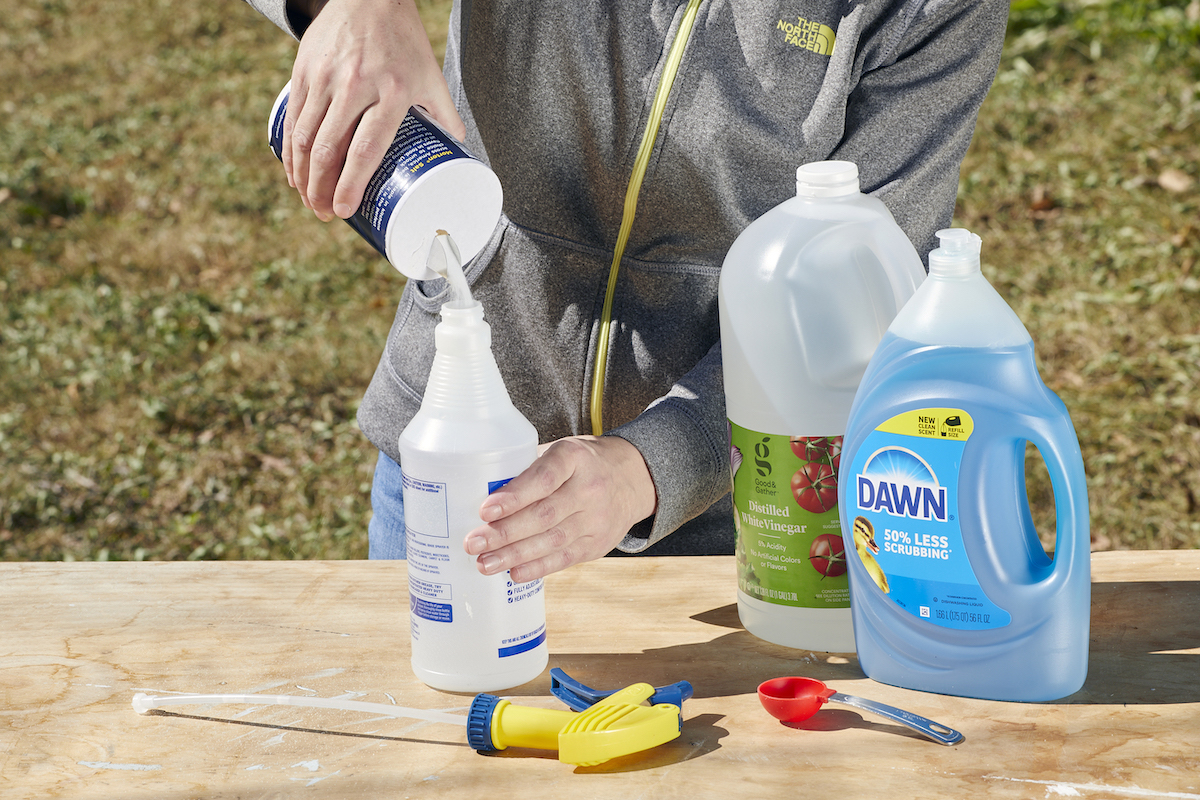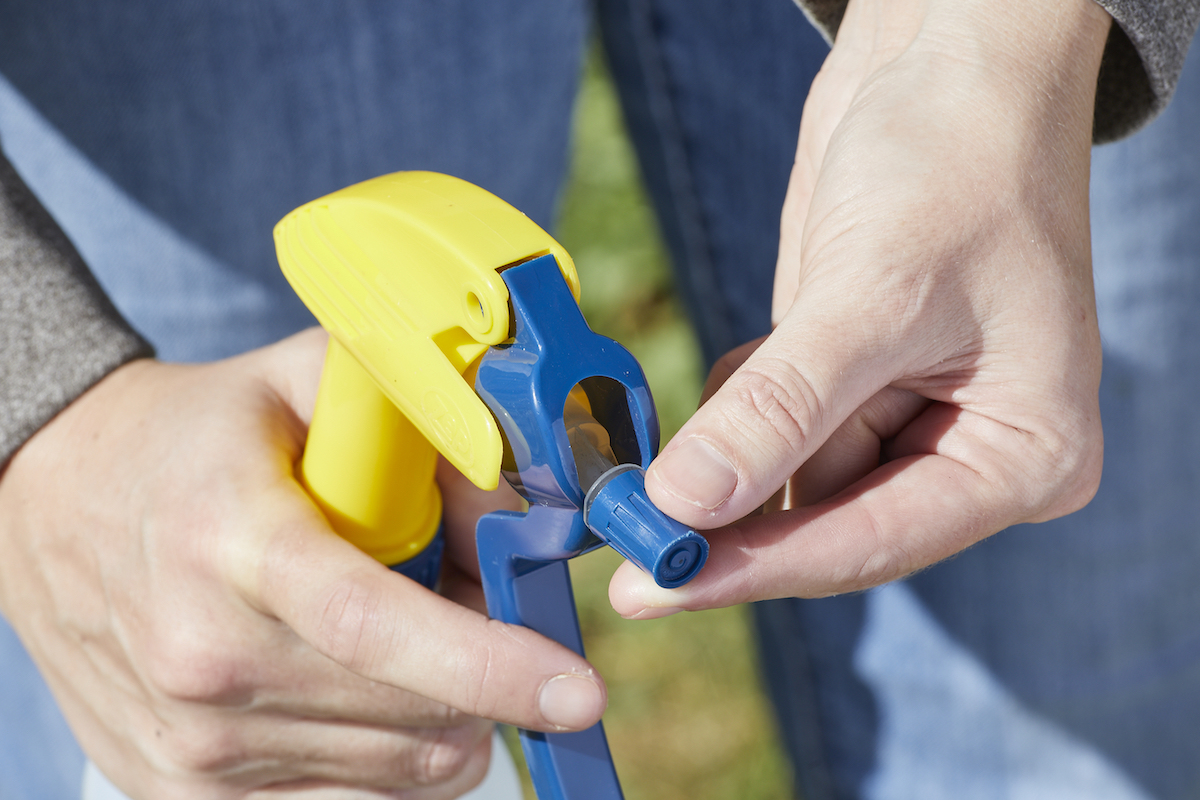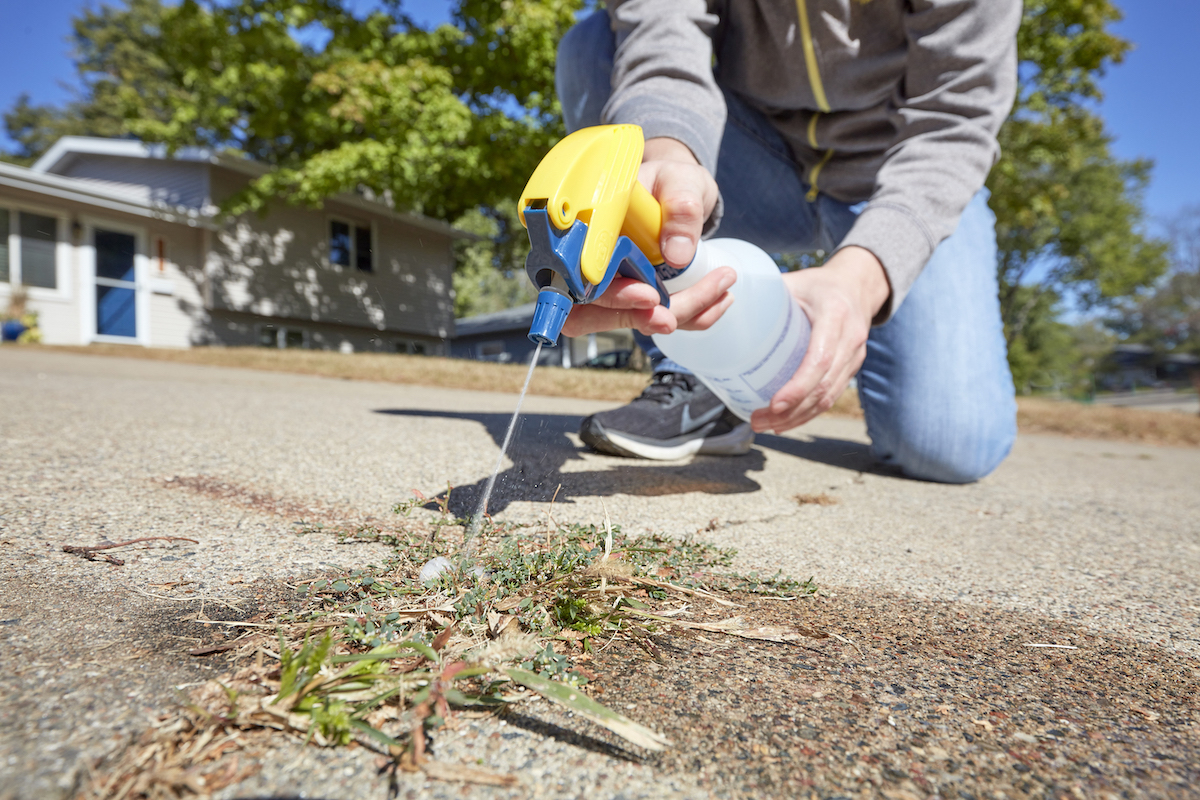We may earn revenue from the products available on this page and participate in affiliate programs. Learn More ›
What You Need to Know
- Vinegar, especially when mixed with salt, is a natural herbicide that is safer and less expensive than commercial herbicides.
- Overuse of vinegar or salt in the garden can negatively affect the growth of desirable plants by making the soil inhospitable.
- The most effective way to use vinegar as an herbicide is spraying directly on weeds’ leaves on a sunny day.
- Vinegar may only kill weeds temporarily as it does not target the root of the weeds.
Q: I have always used commercial weed killers to keep the weeds out of my garden and patio. Recently I’ve read some reports that say they can be dangerous for my health and the environment. My neighbor suggested that I try using vinegar, but it seems like something I can eat will be too weak to be effective. Does vinegar kill weeds?
A: Some chemicals in commercial weed killers can cause concern, especially if using them near fruit or vegetable plants. If you’re wondering, “Does vinegar kill weeds?” you’re in luck. Vinegar can be an effective weed killer when used appropriately. It’s a natural herbicide and no more dangerous than the vinaigrette you’d use to dress a salad. Also, large bottles of vinegar are cost-effective and useful for cleaning and cooking, so it’s not a single-use product that will languish on a garage shelf.
Vinegar kills weeds quickly, usually within 24 hours, but does not discriminate between the weeds you want to kill and the plants you want to grow, so apply the vinegar carefully and in the right conditions. Vinegar’s efficacy depends on the weather and the solution’s concentration. If weeds are extensive, or if you are worried about your garden’s integrity, a professional can tackle the issue.
If you add salt to the vinegar solution, it will be more effective.

Vinegar is acidic and will eventually kill most broadleaf weeds, but the acid will kill the leaves before reaching the root system, and the weeds may grow back quickly. For longer-lasting removal, mix 1 cup of table salt with 1 gallon of vinegar. Salt dries out the weed’s root system. To make the solution more potent, add 1 tablespoon of plain dish soap. Dish soap contains surfactants that will dissolve any protective coating on the leaves. Apply this solution to the leaves of the weeds, not to the soil.
Note that overuse of this solution or adding too much salt in the vinegar mixture can make the soil inhospitable.
Application of a salt-and-vinegar weed killer should be generous, but only to the weeds’ leaves. Adding acid and salt to the soil around the plants will kill nutrients in the ground that are essential to plant life, so the soil’s saturation means that weeds won’t be able to grow there, but neither will anything else. If you’re repeatedly spraying in the same area of a garden, you may need to consider weeding by hand or getting professional help.

Use a spray bottle with an adjustable nozzle that sprays a steady stream instead of a mist.

Vinegar and salt are nonselective desiccants, which means they don’t know which plants to kill or protect. This solution can also discolor or erode concrete and some metals. The best way to apply a vinegar weed killer is with a spray bottle set to a stream rather than a wide spray, so the solution lands precisely where you aim it. Many bottles feature an adjustable nozzle to sharpen the stream, which will make it easier to spray leaves (and not the dirt) or get between pavers. Plan to apply the solution on a day that’s not windy to prevent it from blowing where you don’t want it.
Always spray your weeds on a sunny day; any rain will flush out the solution, and you will have to reapply the solution to the weed growth.
Sun and heat will magnify the acid’s effectiveness and pump up the salt’s dehydrating effects. Spraying this weed killer early on a day forecast to be warm and sunny will make it work faster. While many commercial weed killers promise to stick to weeds and keep working through rain, a vinegar-and-salt solution doesn’t contain those extra chemicals, and rain will wash it away. So plan to reapply the solution after the rain if a surprise shower arrives.

Tried-and-True Advice
“I used to live in an open area that was often windy, so I took some precautions when spraying vinegar or herbicides.
I only used vinegar or any weed killer in walkways or the borders of beds (weeds that grow between rocks and pavers are tough to remove by hand) to avoid harming other plants or soil. When spraying, I would carry along a piece of cardboard that I could place between the sprayer and any nearby plants to help prevent drift.
I’ve also used a 5-gallon bucket with the bottom cut out. Just slip it over the weed and spray, letting the bucket catch spray from all sides (and cleaning the bucket afterward or designating one for that purpose). We also were fortunate to obtain horticultural vinegar from a local water conservation district; its 20 percent acid is more effective on larger weeds.”
—Teresa Odle, Contributing Writer and Editor
The vinegar-and-salt solution likely won’t prevent weeds from growing as it doesn’t reach the weed’s roots.
Adding the salt to the vinegar does a better job of preventing weed regrowth than vinegar alone, but vinegar is not a permanent solution to all weed regrowth. Even with the salt added, the greenery will likely die before the root system is completely dried out, so regrowth may eventually occur. Even with commercial weed killers, weed seeds are everywhere in the soil, and the only way to entirely kill the seeds is to soak the soil with the solution, which spoils the soil for future growth. If weeds are ruining your garden and this DIY option won’t cut it, a professional will be able to address the issue and help you maintain a beautiful garden.



